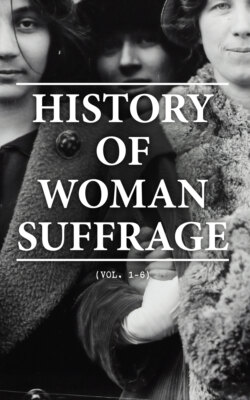Читать книгу History of Woman Suffrage (Vol. 1-6) - Various - Страница 92
На сайте Литреса книга снята с продажи.
AN ACT CONCERNING THE RIGHTS AND LIABILITIES OF HUSBAND AND WIFE.
ОглавлениеThe Act of 1860161 was offered by Andrew J. Colvin in the Senate as a substitute for a bill from the Assembly, which was simply an amendment of the law of 1848. Senators Hammond, Ramsey, and Colvin constituted the Judiciary Committee, to whom the bill was referred. Mr. Colvin objected to it for want of breadth in giving to married women the rights to which he thought them entitled, and urged that a much more liberal measure was demanded by the spirit of the times. In one of Miss Anthony's interviews with Mr. Colvin, she handed him a very radical bill just introduced in the Massachusetts Legislature, which after due examination and the addition of two or three more liberal clauses, was accepted by the Committee, reported to the Senate by Mr. Colvin, and adopted by that body February 28, 1860162. The bill was concurred in by the Assembly, and signed by the Governor, Edwin D. Morgan. It is quite remarkable that the bill in its transit did not receive a single alteration, modification, or amendment from the time it left Mr. Colvin's hands until it took its place on the statute-book. The women of the State who labored so persistently for this measure, felt that the victory at last was due in no small degree to the deep interest and patient skill of Andrew J. Colvin. Hon. Anson Bingham, chairman of the Judiciary Committee, who did good service in the Assembly at this time, should be gratefully remembered by the women of New York. Mr. Bingham acted in concert with Mr. Colvin, both earnestly putting their shoulders to the wheel, one in the Assembly and one in the Senate, and with the women pulling all the wires they could outside, together they pushed the grand measure through.
Judge Bingham served our cause also by articles on all phases of the question over the signature of "Senex," published in many journals throughout the State. And this, too, at an early day, when every word in favor of woman's rights was of immense value in breaking down the prejudice of the ages.
In addition to this, another act of great benefit to a large number of housekeepers, called the "Boarding House Law," was secured by the same members. Miss Emily Howland, Mrs. Margaret Murray, Mrs. Manning, and Mrs. Griffith Satterlee spent some weeks in Albany using their influence in favor of this measure.
In February, 1860, Emily Howland arranged a course of lectures on Woman's Rights, to be given in Cooper Institute, New York. Henry Ward Beecher delivered his first lecture on the question in this course, receiving his fee of $100 in advance, as it was said he considered no engagement of that sort imperative without previous payment. Mr. Beecher's speech was published in full in The New York Independent, of which he was then editor-in-chief. The State Committee purchased a large number, which Lydia Mott, of Albany, laid on the desk of every member of both Houses. At the time we felt the speech worth to our cause all it cost.
